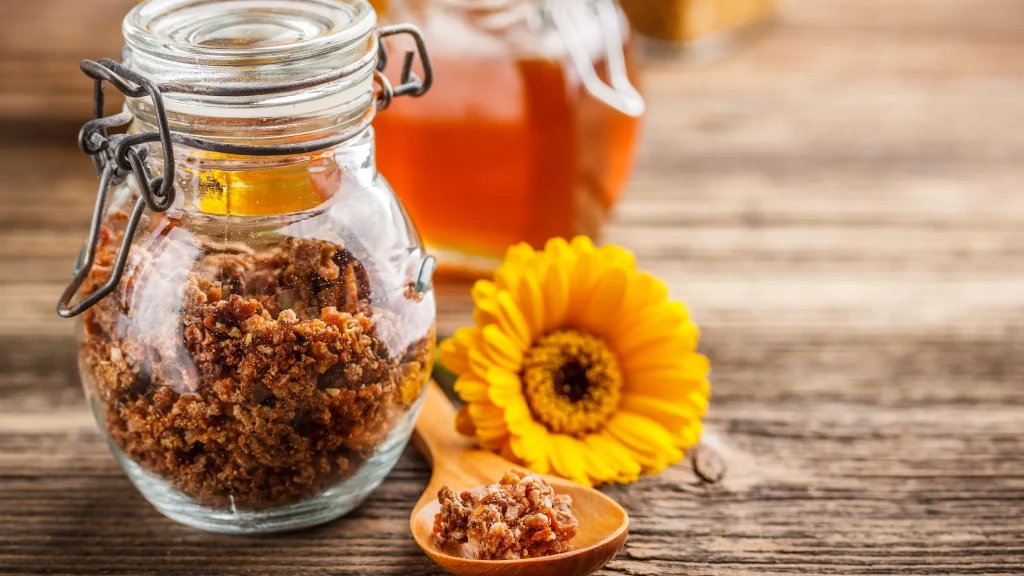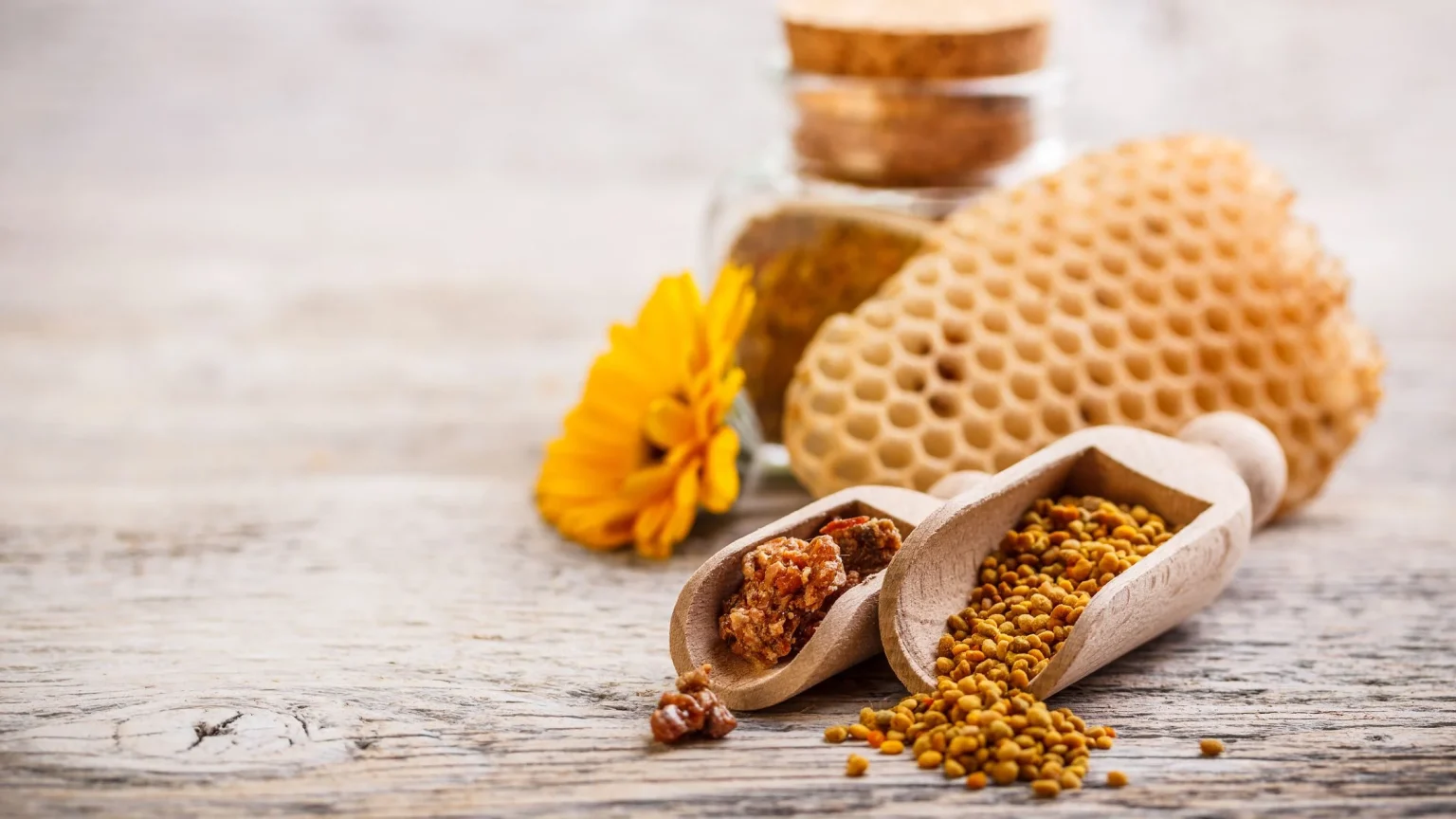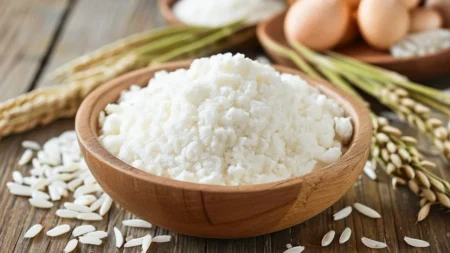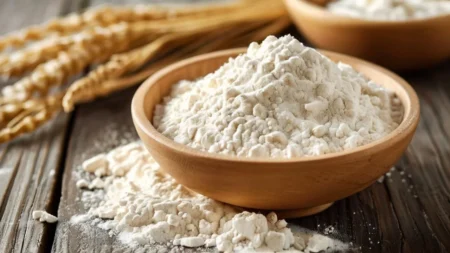Propolis, also known as “bee glue,” is a natural resin produced by honeybees. It has been used for centuries in traditional medicine and is increasingly gaining attention for its remarkable health benefits. This article will explore the various ways in which propolis can enhance our well-being, from its potent antibacterial properties to its immune-boosting and antioxidant powers. Discover how this versatile bee-derived substance can be a valuable addition to your natural health regimen.

Key Takeaways
- Propolis is a natural resin produced by honeybees, used in traditional medicine for its numerous health benefits.
- Propolis has potent antibacterial properties, making it a valuable natural antibiotic alternative.
- Propolis is rich in antioxidants, including flavonoids, which can help neutralize harmful free radicals and support overall health.
- Propolis has been shown to boost the immune system and support the body’s natural defenses.
- Propolis can promote wound healing and tissue regeneration due to its anti-inflammatory and antimicrobial properties.
Introduction to Propolis
Propolis, also known as “bee glue,” is a sticky, resinous substance that honeybees collect from various plant sources, such as tree buds, sap flows, and other botanical sources. Bees use this natural resin to seal and protect their hives, creating a protective barrier against the elements and potential pathogens.
What is Propolis?
Propolis is a complex mixture of beeswax, essential oils, and various plant-derived compounds, including resins, flavonoids, and phenolic acids. Bees gather these materials from the bee-derived substances found in their environment and then use them to maintain the structural integrity and health of their hives.
The Origins of Propolis in Beekeeping
The use of propolis by bees dates back thousands of years, with beekeepers around the world recognizing its importance in the apiary products and beekeeping industry. Bees use propolis to seal cracks, reinforce honeycombs, and create a sterile, pathogen-free environment within their hives, making it a crucial component of their natural bee resin and bee glue production.
| Propolis Compound | Percentage in Propolis |
|---|---|
| Resins and Balsams | 50-70% |
| Waxes | 20-35% |
| Essential Oils | 5-10% |
| Pollen | 5% |
The Potent Antibacterial Properties of Propolis
One of the most well-documented and widely recognized benefits of propolis is its potent antibacterial properties. Propolis has been extensively studied for its ability to inhibit the growth and proliferation of a wide range of harmful bacteria, making it a natural antibiotic alternative.
Propolis as a Natural Antibiotic
The antimicrobial compounds found in propolis, such as flavonoids and phenolic acids, have demonstrated the capacity to effectively combat various bacterial infections. Numerous studies have shown that propolis can target and disrupt the cell membranes of pathogenic bacteria, interfering with their ability to thrive and reproduce.
Fighting Bacterial Infections with Propolis
In addition to its antibacterial properties, propolis also exhibits anti-inflammatory and antimicrobial effects, making it a valuable tool in the treatment and prevention of bacterial infections. Propolis has been explored as a potential alternative medicine and herbal remedy for a variety of ailments, from respiratory infections to skin conditions.
Propolis and Antioxidant Power
In addition to its impressive antibacterial properties, propolis is also renowned for its potent antioxidant capabilities. The rich concentration of antioxidant compounds, including flavonoids and phenolic acids, give propolis the ability to neutralize harmful free radicals and mitigate the effects of oxidative stress.
These antioxidant compounds found in propolis play a crucial role in protecting the body against the damaging effects of free radicals and oxidative stress. By scavenging these reactive molecules, propolis helps to maintain a healthy balance and prevent cellular damage that can lead to various health issues.
The phenolic compounds and flavonoids in propolis have been extensively studied for their ability to inhibit the formation of free radicals and enhance the activity of other antioxidant systems within the body. This makes propolis a potent natural antioxidant that can be leveraged to support overall health and well-being.
Beyond its direct antioxidant effects, propolis has also been shown to stimulate the production of endogenous antioxidant enzymes, further bolstering the body’s defenses against oxidative stress. This dual-action approach makes propolis a valuable apiary product for supporting overall health and wellness.
Boosting the Immune System with Propolis
Propolis has long been recognized for its ability to support and enhance the immune system. The unique blend of compounds found in propolis, particularly the flavonoids, play a crucial role in modulating immune function and helping the body’s natural defenses fight against threats.
The Role of Flavonoids in Immune Health
The flavonoids present in propolis are potent antioxidants that can help strengthen the immune system. These plant-based compounds have been shown to stimulate the production of immune cells, such as lymphocytes and phagocytes, which are essential for fighting off infections and defending the body against pathogens.
Additionally, the anti-inflammatory properties of propolis and its flavonoids can help reduce inflammation, which is a key factor in maintaining healthy immune function. By addressing inflammation, propolis can support the body’s natural ability to respond effectively to threats and maintain a strong immune system.
Propolis Supplements for Immune Support
In recent years, propolis supplements have gained popularity as a natural way to support immune health. These supplements, derived from the apiary products of honeybees, provide a concentrated source of the beneficial compounds found in propolis, including flavonoids and other antioxidants.
By incorporating propolis supplements into their daily routine, individuals can potentially enhance their immune function and bolster their body’s natural defenses against a variety of health challenges. As a natural remedy, propolis offers a gentle and effective way to support overall immune system health.
Wound Healing and Propolis
Propolis, the remarkable natural resin produced by honeybees, has long been recognized for its exceptional ability to promote wound healing and tissue regeneration. The unique blend of compounds found in propolis, including antioxidants, anti-inflammatory agents, and antimicrobial properties, make it a versatile and effective natural remedy for a variety of wound-related concerns.
Propolis in Topical Applications
One of the primary ways in which propolis supports wound healing is through its use in topical applications. When applied directly to the skin, propolis can help create a protective barrier, shielding the wound from further damage and infection. Its antimicrobial properties work to inhibit the growth of harmful bacteria, while its anti-inflammatory actions help reduce swelling and promote healing. Furthermore, the antioxidant compounds in propolis can protect the delicate tissue around the wound from oxidative stress, accelerating the regeneration process.
Promoting Tissue Regeneration
Beyond its topical applications, propolis has also been shown to play a crucial role in the regeneration of damaged tissues. The flavonoids and other bioactive compounds in propolis have the ability to stimulate the production of new cells, facilitating the rapid repair and restoration of wounded or damaged areas. This makes propolis an excellent natural choice for supporting the body’s natural healing processes, whether in the context of minor cuts and scrapes or more extensive injuries.
Whether used in topical formulations or taken as a dietary supplement, propolis has emerged as a valuable natural remedy for wound healing and tissue regeneration. Its multifaceted properties, including its antioxidant, anti-inflammatory, and antimicrobial effects, make it a versatile and effective solution for a wide range of wound-related concerns.
Propolis: A Versatile Herbal Remedy
Propolis, the remarkable bee-derived substance, has a long and storied history as a versatile herbal remedy across various traditional medicine practices around the world. For centuries, this natural resin produced by honeybees has been valued for its diverse health benefits, from its potent antibacterial properties to its antioxidant and anti-inflammatory capabilities.
Traditional Uses of Propolis
In traditional medicine systems, propolis has been extensively utilized for its wide-ranging therapeutic applications. Historically, it has been used to support immune system function, aid in wound healing, and even promote respiratory health and oral health. Many ancient cultures, from ancient Greece to traditional Chinese and Ayurvedic practices, have incorporated propolis into their alternative medicine approaches, recognizing its value as a natural antibiotic and versatile herbal remedy.
Modern Applications of Propolis
As modern research continues to uncover the remarkable properties of propolis, this bee-derived substance is finding increasing applications in contemporary natural health and wellness approaches. From antioxidant supplements to topical wound healing formulations, propolis is becoming a widely recognized and valued component of apitherapy, the branch of alternative medicine that utilizes bee-derived products. The versatility of propolis, coupled with its demonstrated efficacy in areas such as immune system support and anti-inflammatory benefits, has made it a sought-after addition to the modern herbal remedy landscape.
Conclusion
As we’ve explored, propolis, the remarkable “bee glue” produced by honeybees, has a long and storied history as a natural remedy with a wide range of health benefits. From its potent antibacterial properties and antioxidant power to its ability to support the immune system and promote wound healing, this versatile bee-derived substance has established itself as a valuable addition to natural health and wellness regimens.
The antioxidants and flavonoids found in propolis make it a powerful tool in the fight against oxidative stress, while its antimicrobial and anti-inflammatory properties make it an effective natural antibiotic and herbal remedy for a variety of ailments. As research continues to uncover the many benefits of propolis, it is clear that this bee-derived substance and apiary product deserves a closer look from those seeking to embrace alternative medicine and natural remedies.
Whether you’re looking to bolster your immune system, support wound healing, or explore the antibacterial and antioxidant properties of this remarkable bee glue, incorporating propolis into your daily routine could be a transformative step towards optimal health and wellness. As we continue to harness the power of nature, propolis stands out as a shining example of the remarkable gifts that can be found in the natural world.
FAQ
What is propolis?
Propolis is a sticky, resinous substance that honeybees collect from various plant sources, such as tree buds, sap flows, and other botanical sources. Bees use propolis to seal and protect their hives, creating a protective barrier against the elements and potential pathogens.
What are the antibacterial properties of propolis?
One of the most well-documented and widely recognized benefits of propolis is its potent antibacterial properties. Propolis has been extensively studied for its ability to inhibit the growth and proliferation of a wide range of harmful bacteria, making it a natural antibiotic alternative.
How does propolis act as an antioxidant?
In addition to its impressive antibacterial properties, propolis is also renowned for its potent antioxidant capabilities. The rich concentration of antioxidant compounds, including flavonoids and phenolic acids, give propolis the ability to neutralize harmful free radicals and mitigate the effects of oxidative stress.
How can propolis boost the immune system?
Propolis has long been recognized for its ability to support and enhance the immune system. The unique blend of compounds found in propolis, particularly the flavonoids, play a crucial role in modulating immune function and helping the body’s natural defenses fight against threats.
How can propolis help with wound healing?
Propolis has long been recognized for its ability to support and enhance the immune system. The unique blend of compounds found in propolis, particularly the flavonoids, play a crucial role in modulating immune function and helping the body’s natural defenses fight against threats.
What are the traditional and modern uses of propolis?
Propolis has a long and storied history as a versatile herbal remedy, with its use dating back thousands of years in traditional medicine practices around the world. As modern research continues to uncover the numerous health benefits of this bee-derived substance, propolis is also finding increasing applications in contemporary natural health and wellness approaches.











